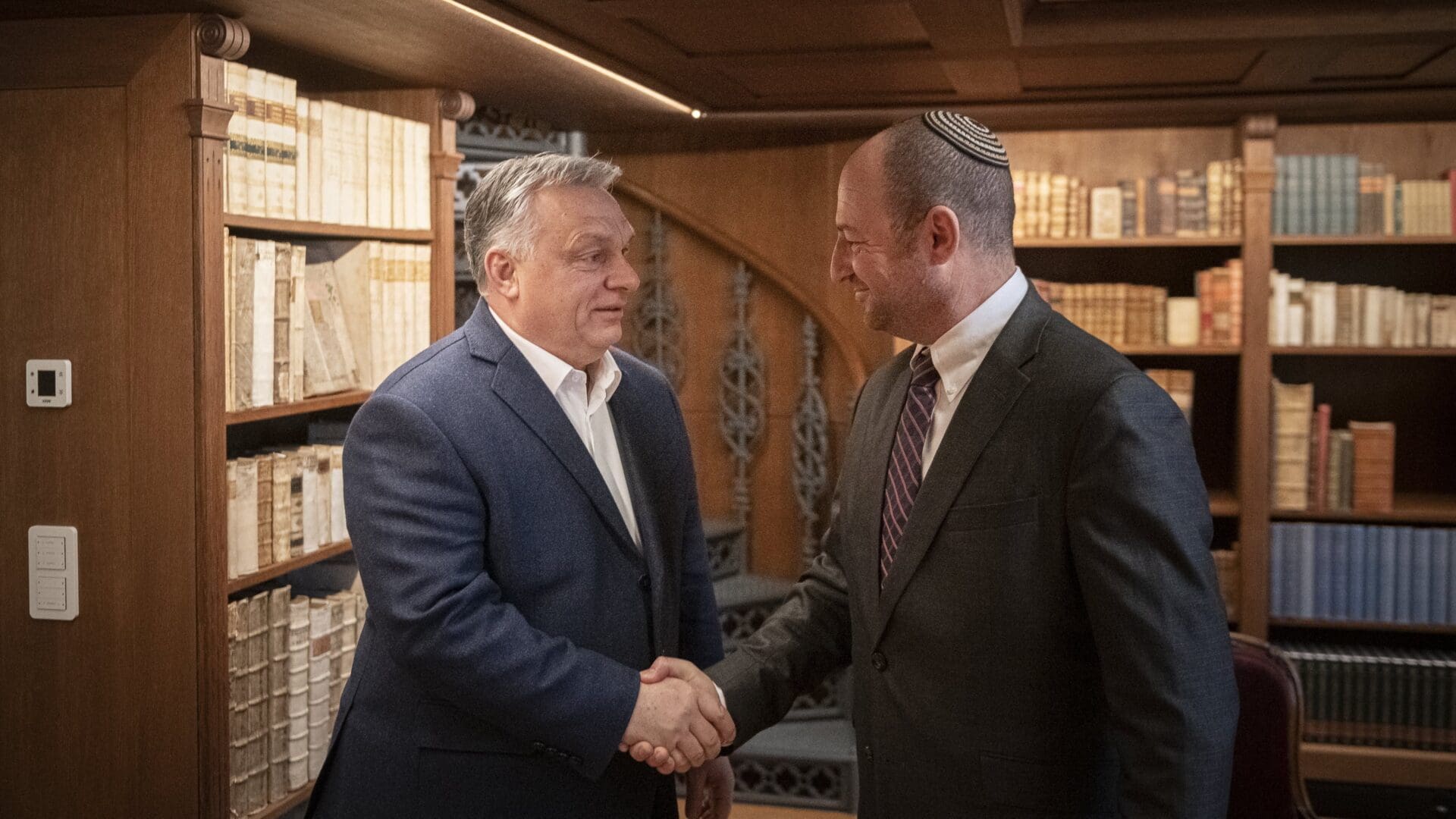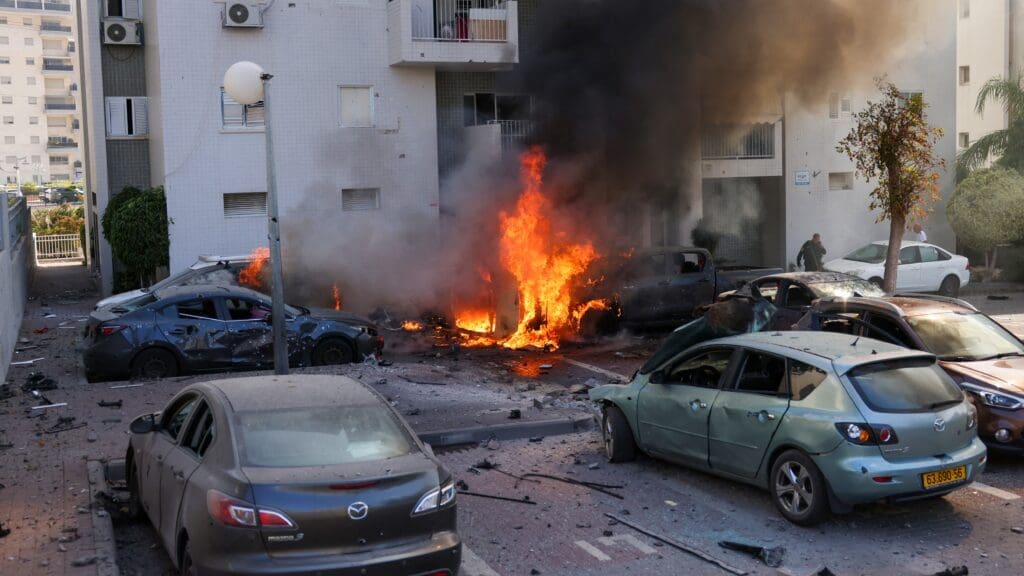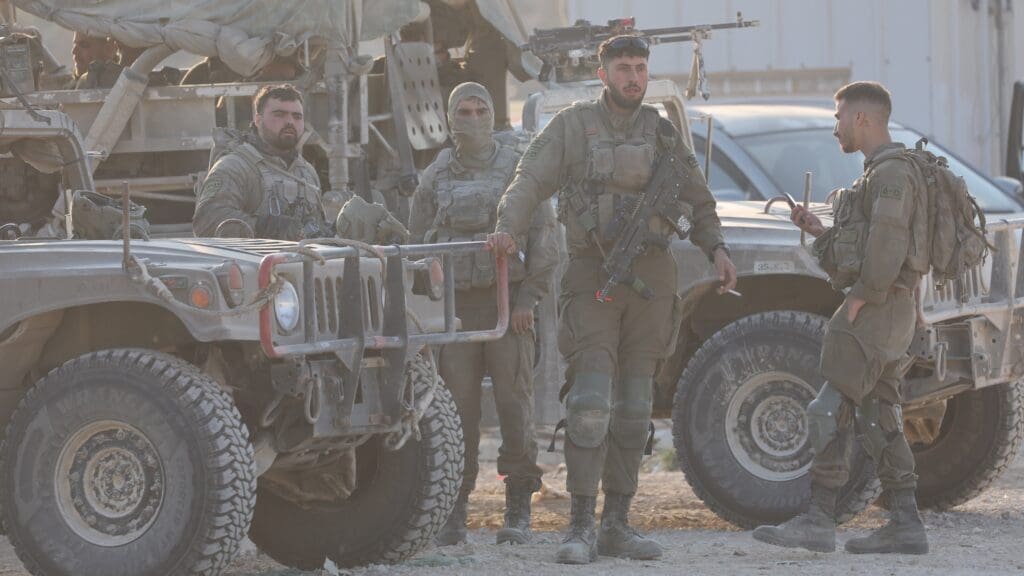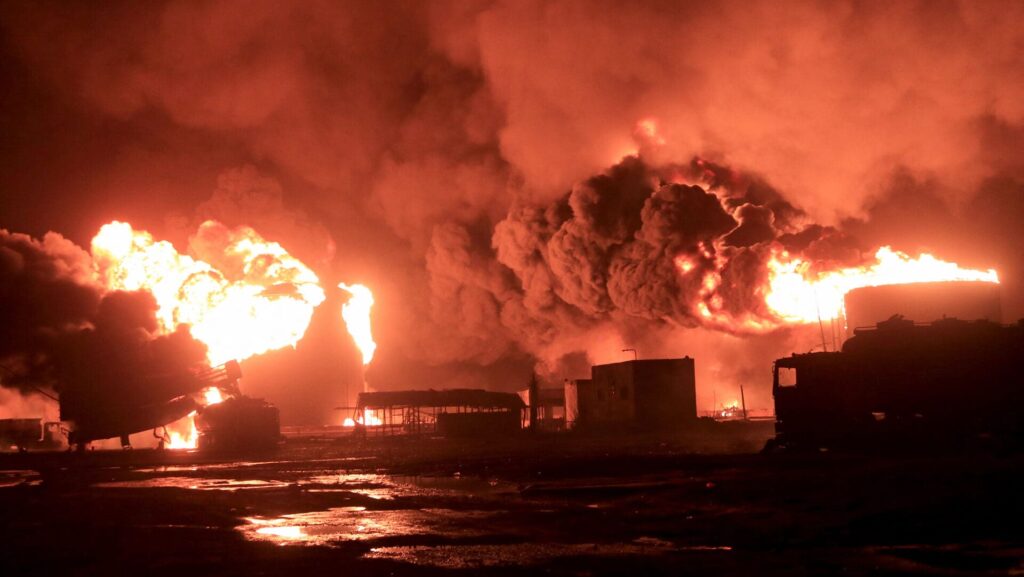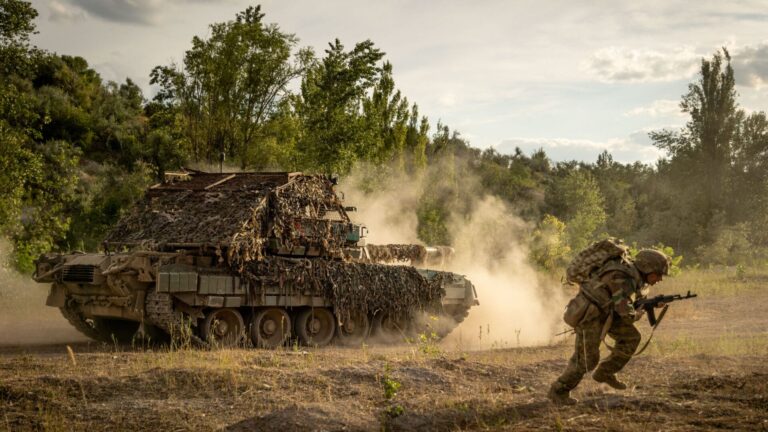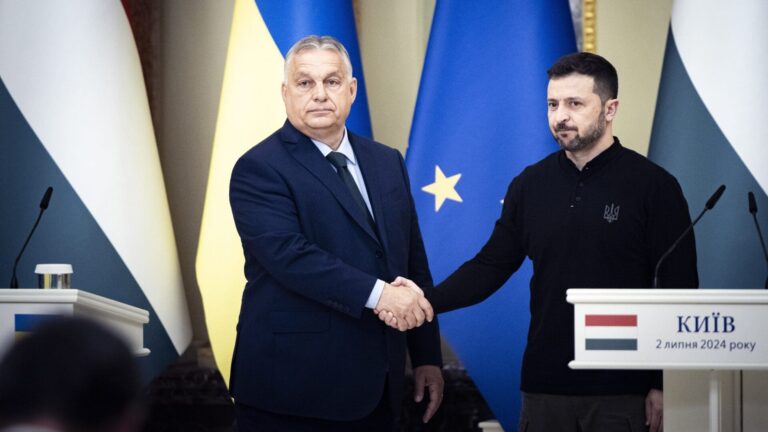In 2021 the Danube Institute launched a podcast series titled Reflections from Budapest, in which we have had several thought-provoking discussions about religious conflict, religious violence, and reconciliation. At the end of 2023, after Hamas’s brutal massacre on 7 October in Israel, we launched a new series focusing on the Middle East and the ramifications of the Israel–Hamas war.
In late February 2024 we had the honour of having a two-part discussion with Amiad Cohen, the director-general of the Tikvah Fund in Israel, publisher of the Hebrew-language Hashiloach journal, and a partner in several business initiatives in the security and technology fields. Mr Cohen has been part of the Israel Defense Forces for almost 24 years. He served as deputy commander of the elite ‘Egoz’ unit and, for several years, was head of security coordination in his native settlement of Eli. He previously directed the industrial and fiscal innovation divisions of the Mateh Binyamin Regional Council.
IDF Managed to Mobilize 350,000 Reservists, Marking Israel’s Largest Mobilization
Since 7 October, Amiad Cohen has been on reserve duty at the IDF, serving as the head of artillery and air support on Israel’s northern border. On the morning of 7 October, which was a Shabbat, Mr Cohen, along with other Israelis, didn’t have their phones, as according to Judaism, it is forbidden to use phones during Shabbat. However, as news came in, they had to break this rule due to emergency, and as soon as Mr Cohen realized that Israel was going to war, he took his army uniform and equipment and started driving to the north. By 6 pm, he was ready for his role in the Israel Defense Forces (IDF) to prevent a northern war against Hezbollah. Since then, Mr Cohen has been fighting in the north to eliminate Hezbollah operatives.
Mr Cohen explained that this was necessary because another war started against Hezbollah on 8 October when it started attacking Israel from the north. Since the war broke out, Hezbollah has fired 3,100 rockets against Israel, and the IDF eliminated 275 Hezbollah operatives. Mr Cohen noted that 83 thousand Israelis have had to be evacuated from their homes along the northern border of Israel. He added that while the IDF obviously couldn’t launch the same war against Hezbollah in Lebanon as against Hamas in Gaza, it still has to pay a strategic price for attacking Israel.
The toll of war extends beyond the field, as Mr Cohen—like many other Israelis—had to leave his six children and wife and 40 employees behind for more than half a year now. Mr Cohen added that it’s more than likely that the war will continue for one and a half or two more years; therefore, for the most part, he won’t be able to be with his family and employees. Despite these hardships, Mr Cohen stressed that he’s honoured to serve in the reserves along with 350,000 reservists. As he phrased it: ‘For two thousand years none of my ancestors had the right and ability to fight for our people, nation and country.’
After the horrifying news about the 7 October massacre came to light, the IDF managed to mobilize a massive number of reservists of 350,000 soldiers, which proved to be Israel’s largest mobilization of its history. Mr Cohen explained that this phenomenon wasn’t surprising as for Israelis it’s obvious to take part in defending their state in times of conflicts and wars. Even though Mr Cohen explained that it is frustrating that some communities of the Israeli society don’t understand the importance of taking part in defending the Jewish state, he added that the majority of communities, including his own community of 60 families, understand its significance. By the afternoon of 7 October, 57 husbands and fathers from his community were on their way to the army to fulfil their reserve duties.
‘There can’t be coexistence when one side wants to eliminate the other’
Mr Cohen explained that in analysing Hamas’s true intentions behind its attack on 7 October, it’s important to discern the military and diplomatic goals the terror organization pursued and their culture of violence. Mr Cohen highlighted that originally, Hamas’s strategy was to undermine Israeli confidence and try to get a diplomatic advantage with fifteen or a maximum of thirty hostages to negotiate and strengthen their position in the balance of power. However, as Mr Cohen explained, Israel’s intelligence and military failure enabled them to be much more successful than they thought. Therefore, instead of breaching five branches of the Israeli fence, they succeeded in fifteen and committed outrageous and brutal atrocities, as can be seen from the videos they took, unleashing their violent culture, which does not differ from what the Nazis did emotionally and culturally. However, as Mr Cohen pointed out, this wasn’t their initial goal as their intentions were to have strong leverage on Israel diplomatically with the taking 20–30 hostages, but in the end, they took 250 hostages and murdered close to 1,500. Mr Cohen stated:
‘When we show weakness, their native nature comes out, which was devastating for us, but at the end it came back to them that we had the understanding that we have to destroy a, their country b, their culture, as we cannot live with a barbaric country and a barbaric culture on our border, one that has the ability to build a strong army and attack us.’
He added that this is going to happen in the north as well, as Israel has a barbaric army called Hezbollah on its northern border, which will also need to be eliminated in the next two years.
The Danube Institute’s research team, led by Professor Jeffrey Kaplan, conducted a three-week-long fieldwork trip to Jordan, Israel, and the West Bank at the end of February 2024. One of their research findings in Jordan was that even for Jordanian Christians, the reaction to what Hamas did on 7 October was that first, they placed the killing in the context of the suffering and disposition of the Palestinians since 1948 and refused to believe or even listen to accounts of the sexual violence that took place. Reacting to the question of how there can ever be peace between the two sides that cannot even share the same reality, Mr Cohen highlighted that
there can’t be coexistence when one side wants to eliminate the other.
He stressed that even though Israel has no problem with living in the Middle East as a minority of 8 million Jews surrounded by 8 billion Arabs and Muslims, for the majority of them, Israel’s existence challenges their identity.
Mr Cohen added that the neo-Marxist world shows support for Palestinians as they believe in the concept of ‘weak is just’. Since the Palestinians are framed in the mainstream media as weak, they feel no need to change their perspective of the Jewish state as they’ll have this narrative and support on their side. Mr Cohen added that, therefore, ‘the only way for Israel to survive in this neighbourhood is being strong and fighting for our survival, and verify that they have no way to think that they can defeat us militarily.’
‘Israel’s conflict with the Palestinians is not only territorial but cultural and moral too’
As noted above, Mr Cohen was also head of the security coordination in his native settlement of Eli. In response to the Palestinian criticism that Israeli settlements in Judea and Samaria are ‘obstacles to peace,’ he pointed out that while there was one incident in 1996 where a Jewish settler killed 20 Palestinians, Palestinian terrorists over the last 40 years have killed thousands of Jewish people in this area. Mr Cohen explained that in 1983, Israel signed a peace agreement with the Palestinian Liberation Organization (PLO), which at the time was led by Yasser Arafat, who soon launched terror against Israel. Mr Cohen highlighted that since 2006, the PLO hasn’t had elections as they fear that if there were an election, Hamas would take over Judea and Samaria as well due to their widespread popularity among Palestinians; therefore, since 2004, the PLO has been led by Mahmoud Abbas.
Mr Cohen stressed that while Israelis denounce acts of violence committed by Jewish individuals, the Palestinian society often glorifies and incentivizes violence against Jews. He highlighted that terrorists who kill Jews are paid for it, streets are named after them, and children are also indoctrinated in school to attack and kill Jews. Therefore
the Jewish State’s conflict with the Palestinians is not only territorial but lies in cultural and moral differences as well.
Mr Cohen highlighted that the reason why currently there cannot be a working coexistence between Israelis and Palestinians is that approximately 50 per cent of those Palestinians, mostly radical Muslims who live and have citizenship in Israel, are trying to change Israel and fight against it, and 90 or even 95 five per cent of the Palestinians who live in Judea and Samaria oppose the Jewish State. Mr Cohen added that the absurdity of the current idea of the two-state solution is that it proposes a Palestinian state in which there are no Jewish people and an Israeli State with Palestinians living inside and enjoying full human rights. Meanwhile, they try to force Israel to lose its Jewish identity and become a non-nation- state; therefore it cannot be called a two-state but rather a one Palestinian state solution. He highlighted that currently, in his view, the only possible solution would be to have a Palestinian state in Jordan and one Jewish state west of the Jordan River in which Palestinians could enjoy full human rights, but if they wish to have Palestinian national rights or threaten the existence of Israel, they would have to live in Jordan. Mr Cohen added: ‘Israel has both a historical identity and a future covenant. We have a shared tradition of 3,500 hundred years of 15,000 thousand years of living in Israel and 2,000 years outside of Israel, however, we’re not only here because of the past but because of the future as well.’
In Mr Cohen’s opinion, since 7 October Israelis have become much more right-wing and nationalist security-wise, as they have understood that they could not have peace with barbaric terrorists. He pointed out that a two-state solution assumed that if Israel separates from the Palestinians, ‘they will leave Israel alone,’ which has been contradicted by historical experience. Mr Cohen explained that the history of the Gaza Strip actually started in the 1950s when it was under Egyptian jurisdiction, and as Israel won the Six-Day War, the territory was taken over by Israel in 1967 with the entire Sinai Peninsula, which Israel gave back to Egypt when they signed a peace treaty in 1978. Mr Cohen pointed out that Egypt didn’t want to take back the Gaza Strip because it understood that the majority of radical Gazans couldn’t be controlled 700 km from the centre of the Egyptian government; therefore, Israel remained to have jurisdiction over the territory until 2006. This led to the 2006 disengagement from the Gaza Strip, in which Israeli troops and settlements withdrew from the territory in exchange once against for peace. ‘We gave it to them to have their country, and they turned it into a barbaric, radical Muslim, fundamentalist country which promotes only one thing: the destruction of the State of Israel, and we cannot allow that to happen again,’ he stressed. Mr Cohen added that after 7 October it became clear that a two-state solution would not be possible in the next forty years.
‘Israel is thankful that Hungary supports the Jewish State in achieving the moral goals of the war’
The primary goal of the Tikvah Fund, a conservative public policy think-tank, is to fill the gap of the representation of the conservative worldview in Israel. Despite the Israeli population being mostly conservative, there is a tension between the people and intellectual elite, Mr Cohen opined. The Tikvah Fund is trying to close the gap by offering and articulating conservative ideas that represent the moral intuitions of the public in Israel.
As Hungarian Conservative reported in 2023, Amiad Cohen met with Hungarian Prime Minister Viktor Orbán in Budapest at the Carmelite Monastery. Balázs Orbán, the prime minister’s political director, wrote the following Facebook post about the meeting:
‘Like Mathias Corvinus Collegium, Tikvah Fund Israel is committed to nurturing talent and building community. We hope that the visit of Director General Amiad Cohen to Budapest will provide a solid foundation for close cooperation between our organisations…Hungary is committed to further strengthening the close cooperation with Israel based on a shared understanding of national interests.’
When asked him how he evaluates Hungary’s strong relationship with Israel, Mr Cohen said: ‘I think there’s a lot of resemblance between Israel and Hungary, and the support is unbelievable, both Israel’s support for Hungary and Hungary’s support for Israel.’
Hungarian Conservative has also reported that Hungary was the lone dissenting EU Member State to refuse to sign a joint declaration of EU foreign ministers calling on Israel not to attack the city of Rafah in the Gaza Strip. Reacting to why Israel has to strike Rafah Mr Cohen explained that the IDF has taken over 80 per cent of the Gaza Strip from Hamas since the war broke out, but what is still mostly under Hamas control is Rafah where they hide Israeli hostages. Mr Cohen highlighted that the two goals of Israel are to destroy Hamas as a government and its territories of the Gaza Strip and to free the hostages, which are goals that cannot be achieved without the strike on Rafah. Mr Cohen added that, of course, the IDF have to be proceed carefully as it’s where most of the Gazan civilians moved, but he reminded that at least 85 per cent of the population support Hamas and civilians also participated in the 7 October massacre. Mr Cohen added that Israel is thankful to the Hungarian people and government for their support in achieving these moral goals during this war.
The IDF is planning to start its strike on Rafah soon, which, according to a Wall Street Journal report, will start with two to three weeks of evacuating civilians to the nearby city of Khan Younis, among other areas, and setting up shelters with tents, food and medical facilities. After the evacuation, the IDF will slowly deploy troops into Rafah and target areas where they believe Hamas leaders and fighters are hiding. Israel has stated that Rafah, where four of Hamas’s 24 battalions are located, is the last major stronghold of the terrorist organization in the Strip. The WSJ piece also highlights that Israel believes that many of the remaining 129 hostages kidnapped during the 7 October massacre are being held in Rafah.
To conclude the discussion, Mr Cohen explained that the only scenario to prevent wars and bring peace and several peace agreements to the Middle East is for Israel to win decisively and destroy or at least hurt Hamas and Hezbollah in a way that it’ll take them thirty years to gain back power. Mr Cohen added that with that, Israel could be an example of how to protect your assets and people. He reminded: ‘Today, the Western world is looking for someone to protect itself from Russia; the US, from Iran, and Taiwan, from China. This is an opportunity for the world, and if I were them, I would support Israel in any way possible.’
Mr Cohen’s more detailed analysis titled ‘Critical Thoughts on Post-War Israel’ can be read in his article on Hashiloach Frontlines.
You can listen to the first part of the Reflections from Budapest podcast series episode with Amiad Cohen here and to the second part here.

